Music Library Donors
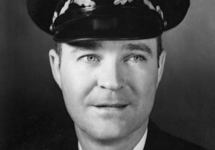 Herbert L. Carter (1920-2007)
Herbert L. Carter (1920-2007)
Herbert L. Carter, Jr. taught at ECU from 1946 to 1991. He graduated from Murray State University (Kentucky), where he began his career as a clarinetist and jazz musician. During World War II, he served in the Unites States Air Force as a woodwind specialist and conductor. After the war, he earned a Master of Arts degree from Columbia University and continued studies at the Julliard School.
Carter’s tenure at ECU was characterized by a number of “firsts.” He established the university’s first band program, first jazz band (known as The Collegians), and first summer music camp. In addition, he chaired the instrumental department, conducted state high school band clinics, and served as adjudicator for music festivals across the country.
Carter’s wind ensemble performed at meetings of the College Band Director’s National Association and the Music Educator’s National Conference as well as the North Carolina Music Educators Conference. Under his direction, the wind ensemble premiered works by such noted composers as Gould, Giannini, Dello Joio, and Persichetti, the last of which is memorialized in the music library’s collection of papers concerning Chorale Prelude: O God Unseen, which Carter donated to the music library sometime before 2000. Carter served as President of the North Carolina Band Association and province governor of Phi Mu Alpha Sinfonia music fraternity, was a member of the American Bandmasters Association, was selected as one of the ten most outstanding music directors in the United States by School Musician magazine, and received the Citation of Excellence from the National Band Association. His students continue his legacy throughout the United States and internationally.
More information about Herbert L. Carter can be found in ECU Chronicles
 Gerald Cunningham (1937-2018)
Gerald Cunningham (1937-2018)
Michael G. Cunningham was born in Warren, Michigan, and holds music degrees from Wayne State University in Detroit, the University of Michigan, and Indiana University. From 1973 to 2006 he was professor of theory/composition at the University of Wisconsin-Eau Clare. He has also published a number of original compositions and books on music theory and composition. Cunningham crossed paths with Gregory Kosteck at the University of Michigan, and from time to time they shared their compositional output with each other. This left Cunningham with a small collection of Kosteck’s scores, among them the violin concerto that won the 5th International Henryk Wieniawski Composers Competition in 1980. Cunningham sent the scores to Mills Music Library at the University of Wisconsin-Madison in the early 1990s, where they sat until 2015, when they were discovered and offered for addition to the music library’s Gregory Kosteck Collection.
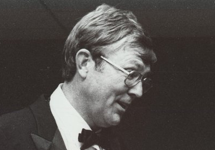 Robert Hause (1935-2010)
Robert Hause (1935-2010)
Robert Hause III was born and raised in Shelby, NC. He graduated from Shelby High School, where he composed the school’s alma mater. He attended the University of Michigan, where he earned his cum laude Bachelor of Music Education degree in 1958 and his Master of Music Education degree in 1960.
Early in his career, Hause taught music in the Jacksonville, Florida, public school system and served as assistant conductor of the Jacksonville Symphony Orchestra. He taught music and theory at Stetson University in Deland, Florida, from 1962 to 1967 before accepting a position as music professor and conductor of the ECU symphony. Highlights of his ECU career include: (1) leading the ECU symphony in collaboration with Charles Kuralt and Loonis McGlohon for the production of “North Carolina is My Home” for UNC Public Television; (2) conducting the ECU symphony in two performances of Beethoven’s Ninth Symphony, both of which were recorded on LP and are held by the music library; and (3) founding, and serving as director of, the North Carolina Suzuki Institute.
He also contributed to the local arts scene in a number of ways: (1) serving as one of the founders of the Greenville Boys Choral Association; (2) conducting the Greenville Community Symphony on many occasions, including collaborating with the North Carolina Academy of Dance Arts for their annual production of The Nutcracker ballet; and (3) creating an annual series of special concerts for local elementary school children.
Hause’s passion for music education translated into a tireless devotion to the Phi Mu Alpha Sinfonia music fraternity, for which he served as province governor and national president. He was also a member of the Phi Beta Kappa, Phi Kappa Phi, and Pi Kappa Lambda fraternities.
Upon his retirement from ECU, Hause offered his collection of salon orchestra music to the Music Library. He had included it in the School of Music’s orchestra library for many years, but knew it would not be retained after his departure. Given its unique character and potential for future research, the Music Library accepted the collection and named it after the donor.
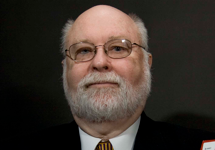 Thomas Mallison (1940-2015)
Thomas Mallison (1940-2015)
Greenville native and ECU alumnus Thomas Mallison was well-known to eastern North Carolina jazz lovers as host of the weekly Public Radio East jazz program An Evening with TomtheJazzman for over 30 years. He was a jazz fan since his teens and began his broadcast career while in college after winning a contest sponsored by a Greenville radio station. In addition to winning the contest, he was offered an announcing and programming position—activities he continued as a consuming hobby throughout his life.
Professionally, Mallison served as Manager of External Affairs at DuPont for over 32 years. In his retirement, he continued his dedication to Jazz with memberships in the International Association for Jazz Education and the Jazz Journalist Association. He frequently conducted workshops for, and had his photography featured through, both of these organizations. He was a charter member of the Coastal Jazz Society, was a co-founder and president of Friends of Jazz at ECU, and was a contributing writer and photographer for JazzWeek magazine.
Mallison’s enthusiasm for jazz was closely matched by his enthusiasm for his alma mater, where he served on the Board of Visitors, the College of Education’s Advisory Council, the S. Rudolph Alexander Performing Arts Series (SRAPAS) Selection Committee, and the Laupus Library Board. He also served in several ECU leadership positions, most notably chair of the College of Education’s Advisory Council and president of the Friends of SRAPAS. His ECU honors and awards were many, and include: (1) membership in the Order of the Cupola and the College of Education’s Hall of Fame, (2) the 1998 Distinguished Alumni Service Award, and (3) the 2009 Robert Wright Society Leadership Award.
In 1992, Governor Jim Martin presented Mallison with North Carolina’s highest civilian award, The Order of the Long Leaf Pine. In 2003, jazz radio programmers from across the U.S. voted him the first recipient of JazzWeek’s Duke Dubois Humanitarian Award for his efforts in the promotion of jazz and jazz education, and his dedication to assisting other jazz radio programmers and stations.
Mallison began building the music library’s TomtheJazzman Collection in 2009 with a gift of LPs, and in 2014 expanded his gift to include CDs. Sadly, he died in an auto accident on September 6, 2015, while returning home after hosting his weekly radio show.
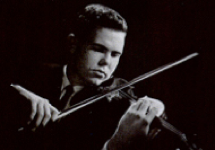 Thomas Moore (1938-2011)
Thomas Moore (1938-2011)
Winston Salem, North Carolina, native Thomas Moore was born into a musical family. As a result, his music training began at an early age and culminated in graduate studies at the Eastman School of Music. Early in his career, Moore taught at Ohio State University and University of Wisconsin School of Music. While professor of violin and chamber music at University of Wisconsin, he performed with the famed Pro Arte Quartet and acquired the violin he would play for the remainder of his life, a 1750 Bergonzi. In 1979, he moved to the University of Miami, where he served as professor of violin and chamber music, founded the Bergonzi String Quartet, and served as concertmaster for the Florida Philharmonic. This was followed by stints as concertmaster for the Nico Malan Opera House in Capetown, South Africa, professor of violin and chamber music at New World School of the Arts in Miami, and chair of the violin department at the University of the South’s Summer Music Festival in Sewanee, Tennessee.
Moore’s career was also studded with: (1) live broadcasts and filming for video and television productions for such entities as Voice of America, National Public Radio, and European Television; (2) master class appearances in the U.S., Canada, Venezuela, Brazil, Ecuador, South Africa, Italy, and Austria; and (3) solo, chamber music, and concertmaster engagements throughout the U.S., Canada, South America, South Africa, Europe, and the Soviet Union. He also ventured into the area of research, where he received grants for projects involving activities such as analyzing the manuscripts of Juan Arriaga in Bilbao, Spain, and transcribing the songs of Debussy and Ravel for violin and piano.
Moore nurtured and mentored nearly 2,000 string players throughout his 50 years of teaching. Many of them have gone on to do graduate work at premiere music institutions such as the Eastman School, Manhattan School of Music, and the Juilliard School, and followed that with teaching and playing positions in well-known schools and performing ensembles. Those who chose other careers applied the self-discipline and learning methodologies he taught them to their career of choice, be it medicine, engineering, or law.
After Moore’s death, his widow, former ECU nursing professor Sandra Walsh, arranged for the establishment of the music library’s Thomas Moore Collection so his legacy of books, scores, and CDs will benefit music students for years to come.
The ECU Music Library’s Thomas Moore Collection was a lifetime in the making in more ways than one. Not only is it the result of one man’s life-long love affair with the violin, it is the result of a rekindled love affair with a childhood sweetheart. Winston Salem, North Carolina, natives Thomas Moore and Sandra Walsh began their enduring romance in their middle school years with a little help from Sandra, who took up the viola in order to get into the school orchestra and closer to concert master Tom. The plan worked, and a short-lived young romance blossomed.
Fast forward through marriages and child rearing to the 1990s and an incidental mention of Sandra in a high school newsletter read by Tom in Miami, Florida. With a little research and a few mystery phone messages, Tom succeeded in rekindling his decades-old romance with Sandra, then a nursing professor at ECU.
Fast forward once again through 15 years of life together in sunny Miami to Tom’s cancer diagnosis and a call by Sandra to close friend and fellow ECU nursing professor Lou Everett in 2010. Lou and her husband, ECU administrator John Core, did what all good friends would do and investigated the possibility of leaving Tom’s legacy of string music-related books, scores, and CDs to ECU’s music library. Their inquiries were welcomed, and an agreement reached to preserve Tom’s musical legacy—an agreement that provided comfort during Tom’s final months. After three visits to Miami and countless hours of cataloging by music library staff members, the Thomas Moore Collection has come home to North Carolina, where it will continue Tom’s work of training young musicians for years to come.
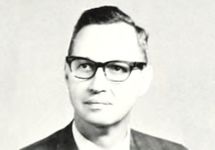 David Serrins (1920-2002)
David Serrins (1920-2002)
David Serrins, a native of Oil City, Pennsylvania, received his Bachelor of Music degree from the University of Florida–Coral Gables, and his Master of Music degree from UNC–Chapel Hill. Before coming to ECU in 1962, Serrins taught music in the Charlotte area public school system, served as principal oboist of the Charlotte Symphony, and was one of the founders of the Charlotte Symphony Youth Orchestra. He is credited with laying the foundation for a quality orchestral program at ECU during his five-year tenure. In a March 3, 1967, letter to Serrins, ECU president Leo Jenkins congratulated him heartily for a superb concert and told him how pleased he was to have him at ECU. Later that year, Serrins heeded the call to return to his alma mater, UNC–Chapel Hill, where he served as oboe professor and symphony conductor until his retirement in 1985.
By all accounts, Serrins’ teaching and music-making were characterized by a rare passion and the ability to communicate that passion to his students and listeners. His daughter and grandson, Joan and Scott Respess, gave his CD collection to the music library because they are alumni of the school and wanted their father’s legacy to continue where his university teaching career began.
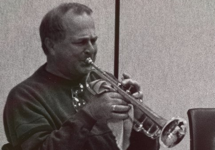 Barry Shank (1932-2014)
Barry Shank (1932-2014)
Barry Shank was born in Ashland, Ohio. After graduating with a bachelor’s degree from Oberlin College Conservatory in 1954, he entered the US Army and served in the 9th Army Band, 4th Infantry, LADD Air Force Base in Fairbanks, Alaska. After early discharge, he studied at the New England Conservatory of Music, graduating with a master’s degree and the first chair trumpet position in the Birmingham (Alabama) Symphony.
In 1962 he joined the music faculty at East Carolina University, where he taught music theory, trumpet, and conducting until his retirement in 1995. During this time, he on several occasions served as director of music for ECU’s Summer Theatre, and for 20 years he both hosted Barry Shank’s Wind Machine in Greenville’s Sunday in the Park series and played in Greenville’s Emerald City Big Band.
Early in his career at ECU he became a friend and supporter of faculty colleague and composer Gregory Kosteck. As such, he amassed a sizeable collection of Kosteck’s compositions, and these form the corpus of the Gregory Kosteck Collection.
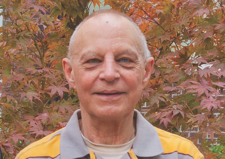 Conrad Sharpe (1937-2012)
Conrad Sharpe (1937-2012)
The son of a geophysicist, Sharpe is a magna cum laude graduate of Massachusetts Institute of Technology with a BS in Industrial Management. After graduating, he spent 20 years as a planner/engineer with General Dynamics Corporation in California working on projects ranging from submarines to tactical missiles. During this time, he used his spare hours to build an airplane and a harpsichord, the latter of which was later donated to the ECU School of Music.
In 1978, the green-conscious Sharpe relocated to Greenville, NC, and began his own company, Carolina General Equities, which specialized in designing and building ultra-high energy-efficient homes. Unfortunately, eastern North Carolina was not ready for Sharpe’s prophetic environmental message and this venture dwindled by 1980, at which time he capitalized on his love of all things audio-visual and became a well-known and -loved store manager at the local Radio Shack until his retirement in 2003. After being diagnosed with terminal cancer in May of 2010, Sharpe quickly decided to donate all of his earthly goods to non-profits and charities in Greenville, the town that had given him so much pleasure. Even before his death, he gave the music library his CD, DVD, score, and music book collections. In addition, he generously gave $50,000.00 from his estate to establish the Conrad Sharpe Music Library Endowed Fund.
 Paul Topper (1925-2015)
Paul Topper (1925-2015)
Dr. Paul Topper was born in Altoona, Pennsylvania. After serving in the Army Air Corps as a navigator during World War II, he returned to study violin performance at the Julliard School under the tutelage of his mentor Mischa Mischakoff. He also studied conducting at Julliard under Frederick Waldman. After further studies at the Chautauqua Summer School, he went on to earn degrees in music from the University of Missouri and the University of Michigan, where he earned his doctorate.
Topper worked as a freelance violinist, conductor, and concertmaster in New York, Indianapolis, Toledo, and Greeley, and taught at Stephens College (Missouri) and the University of Northern Colorado before joining the faculty at ECU in 1963, where he taught and mentored many students until his retirement in 2001. In 1973, Topper founded Summer Strings on the Meherrin, a chamber music ensemble summer camp for young string musicians at Chowan College. He directed the program for an impressive 25-year run, after which he directed Summer Strings at Wesleyan for several years.
Topper supported the local music scene by teaching violin to many Greenville residents and playing with the Tar River Symphony Orchestra. Just before his death he was recognized as a 50-year member of the North Carolina Music Teachers Association, a fitting tribute for one who fostered the careers of many North Carolina professional musicians and music educators.
As an ECU music faculty member Topper interacted regularly with fellow faculty member Gregory Kosteck. These interactions led to Topper being involved with the premiere performances of a number of Kosteck’s compositions. When Topper retired, he came upon the scores of the works he premiered and donated them to the music library for inclusion in the Gregory Kosteck Collection.